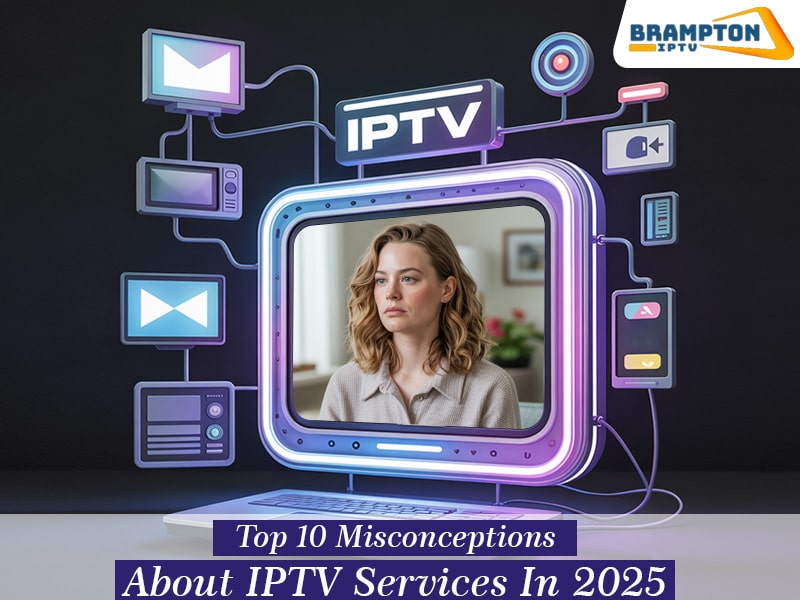
The rise of streaming services has dramatically transformed the way we consume entertainment in this digital age, as their cord-cutting technology allows each viewer to watch personalized content via the internet—anytime, anywhere, on any device. That said, the television landscape has also drastically evolved to deliver a future-proof medium for modern TV enthusiasts to stream their favorite content through IPTV (Internet Protocol Television).
It’s no surprise that the global IPTV market was valued at USD 94.07 billion in 2024 and is projected to reach USD 296.84 billion by 2033, growing at a rate of 12.26%. However, despite this rapid growth and increasing adoption, a cloud of misconceptions still surrounds IPTV, preventing users from enjoying the full benefits of this modern entertainment solution.
To make sure you don’t fall for them, here’s a blog debunking the top 10 myths about IPTV services in 2025.
Also Read: Best IPTV Channel List in Canada 2025
This is probably the most common myth. In reality, IPTV services are perfectly legal, and confusion arises largely because many providers operate illegitimately—subjecting users to risks like poor streaming quality, data breaches, service outages, fines, and more.
Hence, it is crucial for each viewer to choose an IPTV provider that holds proper distribution rights and is reputed for delivering licensed content through legitimate payment methods while ensuring the best user experience and security.
Many assume that IPTV requires expensive premium packages, but this isn’t true unless one opts for extensive channel lineups and features. Generally, IPTV streaming offers a much more affordable way of watching content with plans that have lower upfront costs.
Furthermore, most IPTV providers offer customization options, meaning users pay only for the content they want (e.g., a Bollywood movie lover choosing Indian IPTV), within a suited timeframe—monthly, quarterly, annually, or even for multiple years.
Another concern is that an IPTV service offers only on-demand content, but this is far from actuality in 2025. Modern IPTV services have a growing fan base largely for offering robust live TV capabilities, be it sports events, news channels, reality shows, or something else.
Moreover, many providers are even enhancing the flexibility of real-time IPTV streaming by introducing rich features such as pause, rewind, and fast-forwarding live streams, as well as catch-up TV and cloud DVR options to watch missed shows conveniently.
Also Read: IPTV Subscription Plans
Many believe that setting up and using IPTV is difficult, as switching to a new technology may seem daunting. However, setting up and using IPTV is remarkably simple in comparison to traditional cable or satellite TV services.
First, all one needs is a reliable internet connection and a smart device, and they can easily set up IPTV by downloading an app and entering the provided credentials. Secondly, user-friendliness is rock-solid, with an interface that is typically intuitive and designed for effortless navigation.
Though early IPTV experiences faced backlashes for buffering due to slower internet speeds, 2025’s improved internet infrastructure, including widespread fiber optic and 5G networks, has largely mitigated these issues.
Additionally, many IPTV providers are leveraging technologies such as efficient compression techniques (like H.264/MPEG-4) and content delivery networks (CDNs) to ensure buffering-free 4K/HD streaming.
An IPTV service is designed for multi-device compatibility, allowing users to enjoy seamless connectivity across devices, including Smart TVs, Amazon Fire Sticks, Android and iOS smartphones/tablets, Windows and Mac computers, and Android TV boxes.
This not only empowers viewers with “watch anywhere, anytime” convenience but also frees them from the days when being tied to a single screen was a necessity for TV viewing.
Some still perceive traditional TV services as inherently more reliable. However, this perception needs to change, as outdated TV viewing leads to nothing but compromises, from affordability to flexibility, stability, and quality.
IPTV streaming is all-around in these areas, and when delivered by legitimate providers, it is further dependable with 24/7 customer support and a robust infrastructure that ensures consistent uptime.
As a VPN (Virtual Private Network) hides one’s internet protocol (IP) address, many viewers use it to protect their online identity and prevent their internet provider from throttling video traffic or blocking access to certain servers.
That said, using a VPN for an IPTV service is not necessary but simply an option for those preferring more stable, safer, and private IPTV streaming.
In 2025, many IPTV services offer a wealth of interactive features—including live polls during broadcasts, clickable product placements, real-time comments, multi-angle viewing for sports, and integrated quizzes for educational content.
This level of engagement is a significant step up from traditional linear television and aims to transform the viewing experience far beyond passive viewing.
IPTV streaming is no longer a niche meant for early adopters but the mainstream reality, slowly becoming the standard of TV viewing for millions of viewers each year.
Why? Obviously, their irresistible convenience requiring no technical proficiency or hefty investment at all.
In 2025, IPTV services have truly become a mainstream alternative to traditional TV services by offering multifaceted benefits that continue to shift control from providers to viewers.
By debunking common misconceptions and choosing legitimate IPTV providers, TV buffs can make the most out of IPTV and effortlessly turn their home entertainment experience into something more flexible, immersive, and future-ready.
IPTV itself is perfectly legal as long as you subscribe to an IPTV provider that is licensed and holds proper content distribution rights.
An IPTV service is generally more affordable than cable TV, and many providers even offer customizable plans, letting you pay only for what you watch and for how long.
Absolutely. You never have to miss live content, as most IPTV providers let you stream in real time, be it sports events, news channels, or something else.
No. You only need a reliable internet connection and a compatible device—smart TV, STB, Fire Stick, smartphone, or PC—to get started.
Yes, IPTV is both reliable and serves high-quality streaming experiences, provided you have a stable internet connection and a reputable IPTV provider.